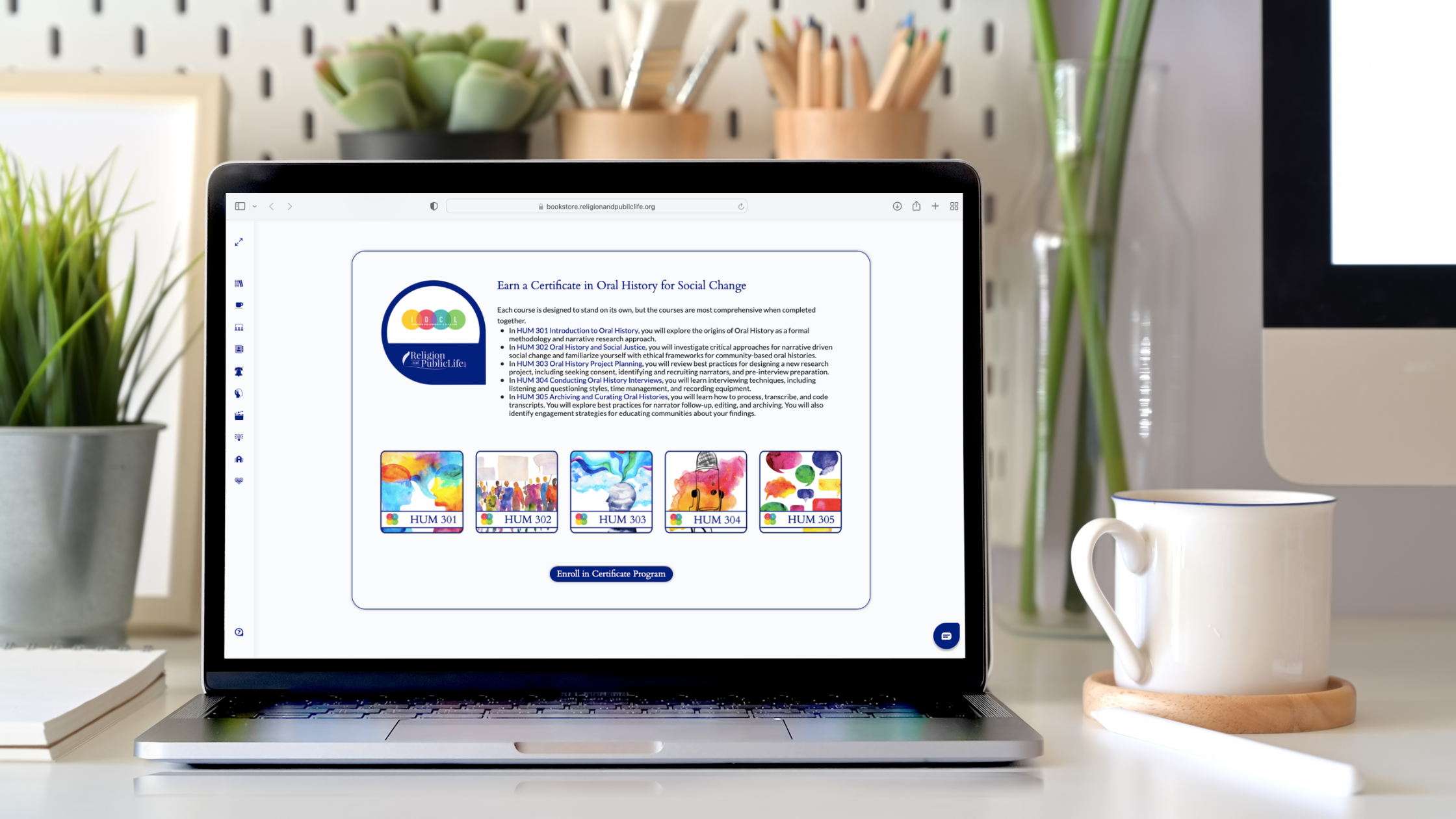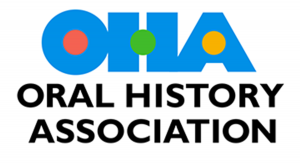New Online Training Program: Oral History for Social Change Certificate
OHR is pleased to share a guest post from our friends at the Institute for Diversity and Civic Life. Eleonora Anneda and Elizabeth M. Melton introduce you to a new online training program: Oral History for Social Change Certificate.
By Eleonora Anneda and Dr. Elizabeth M. Melton
The Institute for Diversity and Civic Life (IDCL) is a growing nonprofit that began in 2015. Our Religions Texas oral history archive features several collections that explore Texas identity and culture, breaking down the stereotypes of what a Texan looks like, believes, and values. In doing so, we advance a vision of a multireligious, multicultural Texas that works for all its people. We seek to amplify underrepresented voices, empower Texans to tell their stories on their own terms, and diversify the historical record. Over the years, we’ve trained community partners, new staff members, and college students to conduct oral histories and we’ve learned a lot about the process of creating an archive from the ground up. When introduced to a new e-learning platform on ReligionAndPublicLife.org we knew that this would be a great opportunity to take our trainings to the next level. With this in mind, we created the Oral History for Social Change Certificate to provide folks with a guide and toolkit to walk them through the process of designing and implementing an oral history project.
Our curriculum design team came to this project with a range of oral history experiences: Eleonora Anedda holds an M.A. in Oral History from Columbia University, Dr. Elizabeth Melton came to oral history through critical performance ethnography and oral history performance, and Dr. Tiffany Puett established IDCL’s Religions Texas Oral History project and archive. The Oral History for Social Change certificate represents the best of our knowledge, experiences, and training in oral history. We at IDCL believe that oral history is a powerful tool for social change. The stories we share can help us describe the world as it is, but they can also be spaces where we identify social problems and imagine social alternatives. Of course, it is one thing to declare the potential of an oral history project to change the world and an entirely other thing to make it happen. Seeing an oral history project from inception to completion can be an intimidating process.
Our certificate program is an asynchronous 15-hour experience for online learners and consists of five on-demand courses that will help learners navigate the practice of community-based oral history:
▸ HUM 301: Introduction to Oral History
▸ HUM 302: Oral History and Social Justice
▸ HUM 303: Oral History Project Planning
▸ HUM 304: Conducting Oral History Interviews
▸ HUM 305: Archiving and Curating Oral Histories
We have designed each course to stand on its own, but the courses are most comprehensive when completed together as the full certificate. Course one focuses on the origins of oral history as a formal methodology and the second course delves into oral history’s relationship to social justice, anti-oppression frameworks, and ethical issues. Courses three through five provide more technical instruction on the tools and skills needed to successfully plan, collect, and archive oral history narratives.
We use a combination of video, audio, interactive exercises, and workbooks to guide learners through the curriculum. The program provides learners with the opportunity to explore the method of oral history and the ways it can be used for social causes and community organizing, and to understand ethical approaches for planning and implementing oral history projects. From a more practical standpoint, through the certificate, attendees discover practical guides, tips, and resources for designing and completing each step in an oral history project, and will have a chance to review notable oral history projects.
One of our primary commitments in designing this training was to make sure we created something that would help oral historians conduct projects ethically, responsibly, and with a full understanding of the field of oral history and its community of scholars. With this in mind, the certificate includes a series of short interviews that we conducted with established practitioners as well as a three-episode podcast series on renowned scholars. We present academic oral history as it overlaps, intersects, and diverges with indigenous oral history. We felt that by including the history of the field—with late 20th century, and early 21st, views and theories from key figures including Luisa Passerini, Alessandro Portelli, and Linda Shopes, coupled with the current understanding that reclaims and rethinks oral history (Farina King, Nēpia Mahuika)—we would offer attendees a more rounded perspective on this method. Practitioners of all levels can appreciate how indigenous oral history practices are rooted in oral history methods and theory, and can also acknowledge the colonial history of oral history.
As most oral historians’ careers are grounded in the work of relationship-building and community, throughout the certificate, we invite learners to think about the legal, ethical, and moral obligations between themselves and the narrators. We introduce concepts like shared authority and co-authorship to encourage practitioners to brainstorm the types of collaboration they envision with narrators and their communities.
We designed the certificate with our oral history community in mind, so whether you’re new to oral history or a more experienced practitioner, we hope you will find the conversations, tools, and resources in the curriculum useful. One of the benefits of the asynchronous format is that learners can complete the lessons on their own timetable. We also worked to make the certificate as rich and comprehensive as possible, while keeping the cost of enrollment low.
The certificate is currently live and anyone can enroll in the certificate by visiting the IDCL bookstore on ReligionAndPublicLife.org. You can complete the course entirely on your own time and schedule, but if you’re interested in more engagement we have a few options in the works. Our goal is to add a capstone component to the course so college students can receive university credit for completing the course, but that will come later in 2023. For now, we are organizing a Winter 2023 cohort where members will still complete the course asynchronously, but in community with one another. Cohort members will meet virtually with course designers, Ele and Elizabeth, at the beginning and end of the cohort period and complete the certificate courses at the own pace over a period of six weeks. Everyone will remain in contact using the course’s discussion board as cohort members independently make their way through the course material. Each person who enrolls in the cohort is invited to meet individually with the course designers to troubleshoot problems, discuss challenges they encounter, and receive individualized feedback about the oral history project they hope to design. Finally, each participant will have the opportunity to showcase their oral history project design and receive feedback and support from the entire cohort at the end of the course period. Our aim is to provide a space of support and community for online learners as they imagine and design exciting, new oral history projects committed to social change.
If your university would like to offer course credit for this certificate, please be in touch with us. You can reach us via email: elizabeth@diversityandciviclife.org and eleonora@diversityandciviclife.org. For more information about this training certificate please visit our website: https://diversityandciviclife.org/resources/oral-history-training-and-certificate/.
Dr. Elizabeth M. Melton is IDCL’s Public Engagement Director. She completed her Ph.D. in Communication at the University of North Carolina at Chapel Hill. During her time at UNC, she created, Unpacking Longview, an anti-racist play based on oral histories she collected about public school desegregation in her East Texas hometown. You can read about her work in the Oral History Review and our blog.
Eleonora Anedda is an oral historian from Sardegna, Italy. She holds an M.A. in Oral History from Columbia University and came to the field from a Gender Studies background. She cares about documenting and preserving untold stories of individuals, families, and communities. Eleonora has worked closely with historians, ethnographers, and community organizers on various research projects—at the Institute for Diversity and Civic Life she serves as an Oral Historian and Curriculum Specialist.


